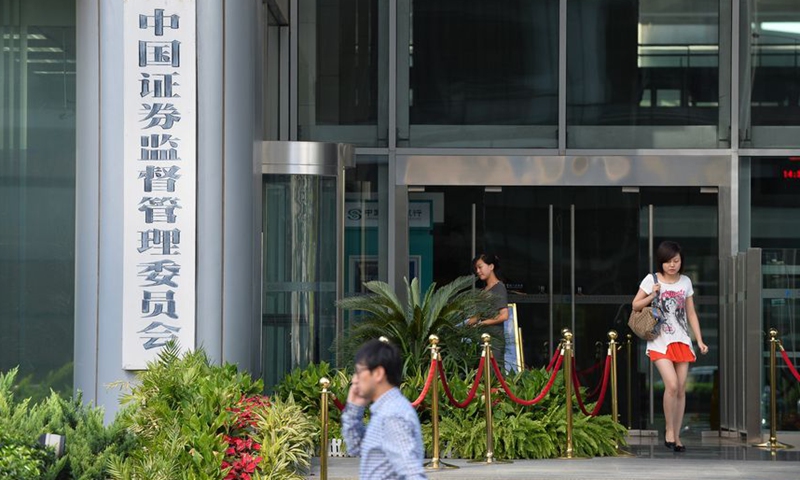
File photo shows the entrance of the China Securities Regulatory Commission (CSRC) in Beijing, capital of China. Photo:Xinhua
Shortly after midnight on Friday, China's securities regulator voiced opposition against politicizing securities regulation, in the wake of the US' announcement of a provisional waitlist of five Chinese firms that may be removed from US exchanges.
Shares of Chinese firms traded in the US routed on Thursday as five Chinese stocks were found to be on a US provisional list of foreign companies that may be delisted if they fail to file accounting reports in line with a tougher US regulatory push against China.
The US Securities and Exchange Commission (SEC) has prepared the provisional list, published on its official website, singling out five Chinese firms that would have to submit evidence disputing identification under the Holding Foreign Companies Accountable Act (HFCAA) by March 29.
Companies provisionally named will have 15 business days to contact commission staff at the SEC if they believe they have been incorrectly identified and should include evidentiary support with their correspondence, read SEC website.
The companies making the provisional list plunged in the US stock market. Among them, BeiGene fell 15.20 percent, Yum China Holdings was down by 10.76 percent, and Zai Lab dropped 21.45 percent as of Thursday.
The provisional list also rolled the US market at large and sent shockwaves through US-traded Chinese firms as a whole, with shares of Alibaba, Pinduoduo, Baidu and JD.com taking a battering.
Stocks of the US-traded Chinese firms generally fell sharply on Thursday, with the Nasdaq Golden Dragon China Index closing down 10 percent, its biggest one-day drop since October 2008.
Under the HFCAA, widely considered to target US-traded Chinese firms, a failure to submit audit working papers for three years in a row could trigger a delisting. This, nonetheless, contradicts the sharper focus China has put on data security, notably cross-border data flows, analysts said arguing against such an intimidating move from the US.
ACM Research, among the five companies on the list, responded on Friday morning that they were placed on the provisional list following the filing of its 2021 annual report because the audit firm currently employed by controlling shareholder ACM Research is not an audit firm reviewed by the US Public Company Accounting Oversight Board (PCAOB).
ACM Research's presence on the provisional list does not mean they will be delisted anytime soon, the company said, noting that they are now actively looking for a solution, communicating and working to meet the US' SEC requirements by the 2024 deadline.
Yum China Holdings said in its statement sent to the Global Times on Friday morning that under the current terms of the Act, the company's common stock will be delisted from the New York Stock Exchange in early 2024, unless the Act is amended to exclude the company or the PCAOB is able to conduct a full inspection of the company's auditor during the required timeframe.
In a rare late-night post on its WeChat official account, the China Securities Regulatory Commission (CSRC) said that it has taken note of the issue, referring to the "pre-delisting list."
The CSRC said that this is a normal step in US regulatory enforcement of the HFCAA and clearly reiterated their position on the implementation of the HFCAA .
"We respect overseas regulators' efforts to strengthen supervision over accounting firms to improve the quality of the financial information of listed companies but firmly oppose the wrong practice of some forces politicizing securities regulation," the CSRC said.
The CSRC is committed to the spirit of openness and cooperation and is ready to resolve the issue of inspection and investigation of relevant firms by US regulators through regulatory cooperation.
This is also in line with the prevailing international practice. Recently, the CSRC and the Ministry of Finance have been engaged in continuous communication and dialogue with the US Public Company Accounting Oversight Board, achieving positive progress.
"We believe that through joint efforts, the two sides will work out cooperation arrangements that meet the legal and regulatory requirements of both countries as soon as possible, while jointly protecting the legitimate rights and interests of global investors and promoting the sound and stable development of the two markets," CSRC said.
Dong Shaopeng, an expert advisor for the China Securities Regulatory Commission, told the Global Times on Friday that it shows that the US is expanding the target of their suppression of Chinese stocks, from technology stocks to stocks with general themes, which is a strategy to block the Chinese economy.
"At present, this suppression trend is getting stronger and stronger, and this delisting trend will appear sooner or later," Dong said, noting that the delisting tide of Chinese concept stocks did not appear before, probably because companies were more or less waiting to see.
"All Chinese companies listed in the US now have the risk of being delisted. But surely, doing so will do great harm to American investors themselves as well," Dong said.
In March 2021, the SEC announced it would begin to implement the HFCAA to tighten oversight of US-listed foreign companies.
While the law mulled under the Trump era was in theory aimed at all non-US companies, it is widely believed to target Chinese companies listed in the US market. Under the HFCAA, companies that fail to comply with the American auditing standards for three years in a row will be delisted from US exchanges.
If the US continues to implement this type of financial hegemony, arbitrarily suppressing US-listed Chinese stocks, it is an inevitable result that Chinese companies will start to get away from the US market and there are many options for them, analysts said.
The homecoming of US-listed Chinese firms has been all the rage over recent years, with a rising number of Chinese companies, including Alibaba, Baidu and JD.com, among other major homegrown technology players having opted for a secondary listing in Hong Kong.


